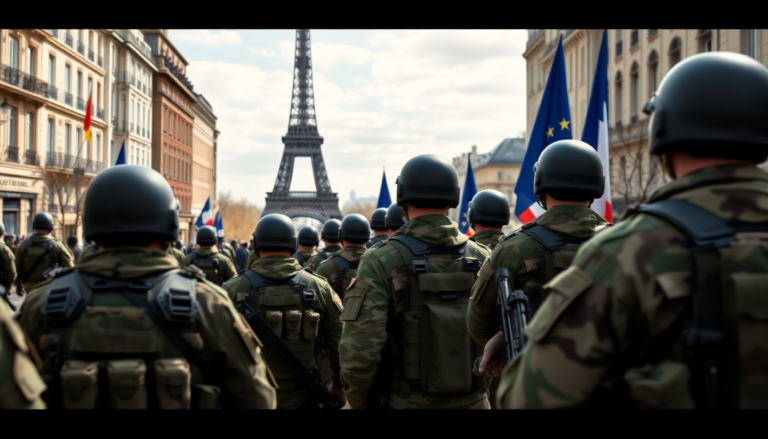Argomenti trattati
Macron’s vision for a militarily autonomous Europe
President Emmanuel Macron is pursuing a long-held ambition of a militarily autonomous Europe, positioning France as a leader on the global stage. This aspiration is deeply rooted in Gaullist ideals, where France assumes a pivotal role in shaping European defense, particularly in the context of the ongoing conflict in Ukraine. Macron’s strategy involves presenting France as the frontline defense for Ukraine against Russian aggression, raising the possibility of deploying French and NATO troops to the region.
During a summit of European leaders, Macron acknowledged that while there is currently no consensus on sending ground troops, he emphasized that “nothing should be excluded” in the dynamics of the situation. He declared France’s commitment to ensure that Russia does not emerge victorious from the conflict. However, this assertive stance has not been universally embraced; key NATO allies such as the United States, the United Kingdom, and Germany promptly dismissed the notion of troop deployment.
In response to this rejection, Macron intensified his rhetoric, accusing Germany and others of cowardice for not supporting a more aggressive military posture. While some critics dismiss his actions as mere political theatrics, it is essential to recognize that Macron’s ambitions reflect a serious consideration of Europe’s strategic needs and the historical context of French foreign policy.
The implications of Macron’s strategy
Macron’s approach has drawn scrutiny, as it seems to contradict his ultimate goal of European military autonomy. The strategy appears heavily reliant on a military-industrial framework that lacks the necessary armed forces and political backing to support such ambitions. Former French ambassador to Moscow, Jean de Gliniastry, articulates this concern, stating that a balanced approach must integrate both military and diplomatic dimensions, a balance that, so far, appears absent.
Despite Macron’s assertive stance that Russia must not win the war, he has yet to clarify what this entails. The ambiguity surrounding the definition of victory raises questions about the feasibility of his objectives. French officials privately align with the U.S. perspective that Ukraine is responsible for determining peace terms, which currently necessitates a complete military defeat of Russia. This stark reality underscores the complexities of achieving a unified European strategy that aligns military actions with diplomatic efforts.
The urgency for Europe to bolster its self-defense capabilities has become increasingly apparent, particularly given the unpredictable nature of U.S. political commitments in the wake of potential changes in leadership. Macron’s hopes that a shared fear of Russia will galvanize European nations to unite under French guidance may be overly optimistic, given the historical reluctance of several Eastern European countries to deviate from strong ties with the U.S.
Challenges to Macron’s ambitions
Macron’s ambitions face significant hurdles, particularly regarding the French military’s capacity to engage in Ukraine without American support. Years of budget cuts have weakened the French armed forces, raising doubts about their ability to act independently on the European stage. The historical precedent of the 2011 military intervention in Libya, where France had to rely on U.S. support to avoid embarrassment, looms large in the current discourse.
Moreover, Macron’s hawkish stance appears to be primarily directed at Eastern European nations, whose governments are adamant about maintaining close ties with the United States. This complicates the prospect of forging a unified European military strategy under French leadership, as mutual interests may not align.
Germany’s role is crucial in this equation; Macron has indicated that achieving long-term strategic autonomy for Europe hinges on a robust military-industrial base, which is contingent on Germany’s involvement. However, the faltering German economy and its growing dependence on the U.S. pose additional challenges to Macron’s vision of a self-sufficient Europe.
The domestic implications for France
At the domestic level, Macron’s attempts to instill fear regarding Russian threats might backfire, particularly if public sentiment does not support military intervention in Ukraine. Current polls indicate that a significant majority of the French population opposes sending troops to Ukraine. Should Macron proceed with troop deployment, he risks igniting a substantial backlash against his administration, as many citizens do not perceive an immediate threat from Russia.
The potential for Macron to become ensnared by his own narrative of urgency surrounding Russia is palpable. If Russia successfully breaches Ukrainian defenses, he may be forced to confront the reality of France’s limitations or escalate military involvement in a manner that could lead to catastrophic consequences.
As discussions about European defense strategy evolve, the complexities of Macron’s ambitions and the geopolitical landscape will continue to unfold, revealing the intricate dance between national aspirations and collective security commitments.
The broader geopolitical landscape
In the broader context, Macron’s push for a more autonomous Europe occurs against a backdrop of shifting alliances and geopolitical tensions. The war in Ukraine has profoundly impacted not only European security dynamics but also the relationships between NATO allies. The question remains whether Macron’s leadership can navigate these treacherous waters while maintaining the delicate balance of power within Europe.
Ultimately, the future of Macron’s vision hinges on his ability to garner support both domestically and internationally, as well as to articulate a coherent strategy that aligns military objectives with diplomatic efforts. As the situation in Ukraine evolves, so too will the implications for Europe’s defense posture and the role of France within that framework.

